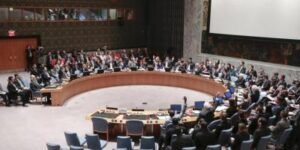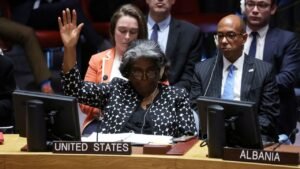In a recent global development, the United States wielded its veto power within the United Nations Security Council, effectively thwarting a pivotal resolution advocating a “humanitarian intermission” amid the ongoing Israel-Gaza conflict. This decision has ignited impassioned discussions and provoked widespread consternation as the world confronts the unfolding humanitarian calamity in the region.

What is the Essence of the ‘Humanitarian Pause’ Proposal?
At the epicenter of this diplomatic standoff lies the ‘humanitarian pause’ proposal, a United Nations Security Council resolution crafted in response to the dire circumstances engulfing the Israel-Gaza conflict. This resolution sought to institute temporary truces, colloquially known as ‘humanitarian pauses,’ within the conflict. The primary objective was to facilitate the unobstructed and secure delivery of vital humanitarian aid to the affected regions. This proposal, enjoying widespread international backing, particularly from Brazil, delineated the following salient provisions:
- Temporary Ceasefires: The resolution posited that all parties embroiled in the Israel-Gaza conflict should observe ephemeral ceasefires, affording a respite from hostilities. These pauses were envisioned as opportunities for humanitarian entities to convey essential aid, encompassing medical provisions and sustenance, to the afflicted populace.
- Humanitarian Corridors: The document called for the establishment of designated ‘humanitarian corridors’ to ensure unimpeded and secure access for humanitarian personnel, streamlining the dispersion of aid to those in distress.
- Safeguarding Civilians: The resolution underscored the imperative need to protect civilians, with a specific focus on children and other susceptible demographics, from the catastrophic ramifications of the ongoing conflict.
- Adherence to International Legal Standards: It emphasized the critical importance of all stakeholders adhering to international humanitarian law and human rights norms to curtail harm to civilians and guarantee the well-being of aid workers.
- Negotiations for a Durable Ceasefire: The ‘humanitarian pause’ proposal aspired to provide a window of opportunity for diplomatic negotiations toward a sustained ceasefire and the resolution of the underlying issues contributing to the Israel-Gaza conflict.
Despite the pervasive international support for this resolution, it encountered an insurmountable roadblock when the United States invoked its veto power.
US Veto Incites Controversy

The United States’ choice to veto the ‘humanitarian pause’ resolution has elicited substantial controversy and fervent debate, both on the domestic front and across the global stage. Detractors assert that the veto undermines the imperative nature of addressing the dire humanitarian crisis within the Israel-Gaza conflict, potentially exacerbating the suffering of innocent civilians ensnared in the crossfire.
Linda Thomas-Greenfield, the US Ambassador to the United Nations, justified this veto by asserting that the draft resolution failed to adequately underscore Israel’s inherent right to self-defense. This stance resonates with the intricate and deeply entrenched geopolitical dynamics within the Middle East, where the Israel-Gaza conflict has endured for numerous years.
Historical Context of US Veto Authority
The United States possesses a historical record of employing its veto authority within the United Nations Security Council to safeguard the interests of Israel. As reported by Al Jazeera, the United States has invoked its veto power a staggering 46 times, predominantly concerning resolutions related to Israel. This historical backdrop introduces layers of intricacy to the current predicament and significantly shapes the manner in which the international community perceives the role of the United States in mediating conflicts within the Middle East.
In this particular scenario, the United States’ utilization of its veto authority has evoked mixed reactions. While some advocate for the United States assertion of Israel’s self-defense prerogative, others contend that prioritizing this facet over the immediate humanitarian requirements of the civilian populace could potentially impede long-term peace initiatives.
Global Response and Ongoing Endeavors
The global community has been actively engrossed in the quest for a resolution to the Israel-Gaza conflict and the amelioration of the humanitarian crisis. Following the US veto, several countries and organizations have diligently strived to devise alternative solutions. For instance, on the 25th of October, Russia and China vetoed a United States-led initiative within the United Nations Security Council to address the Israel-Gaza conflict, an initiative that conspicuously lacked an appeal for humanitarian intermission. These persistent efforts to address the conflict underscore the pivotal significance of diplomacy and international collaboration in fashioning a sustainable solution that guarantees the security and welfare of the affected populations.
Conclusion

The United States veto of the ‘humanitarian pause’ resolution within the United Nations Security Council has reignited the debate encompassing its role in the Israel-Gaza conflict and the broader issue of its veto power within the international arena. This veto resolution has ignited controversy as it prioritized Israel’s right to self-defense over the immediate humanitarian exigencies of the civilian populace. The international community continues to grapple with the intricate dynamics of the Israel-Gaza conflict, underscoring the significance of diplomatic negotiations and endeavors to safeguard the well-being of innocent civilians ensnared in the ongoing hostilities.
As the world observes and awaits a lasting resolution, the Israel-Gaza conflict endures as a prominent exemplar of the precarious equilibrium between geopolitics, international diplomacy, and the imperative necessity to address humanitarian crises in an ever-evolving global landscape.










